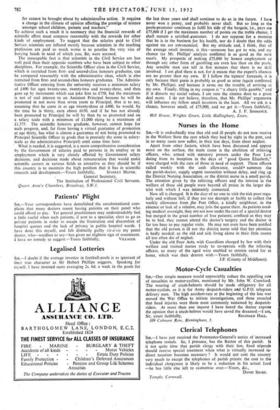Nurses in the Horne
SIR,—II is undoubtedly true that old and ill people do not now receive in the Welfare State the care which they had by right in the past, and in so many cases now suffer, in their last days, from sheer neglect.
Apart from other factors, which have been discussed and appear more on the surface, the -main cause is the abolition of relieving officers, who, armed with statutory powers under the Poor Law dating from its inception in the days of "good Queen Elizabeth," were charged with the care of those in need of support. These officers called weekly with the cash allowance, could summon the the parish-doctor, supply urgent necessities without delay, and ring up the District Nursing Association, or the district nurse in a small parish. The attention given by the relieving officers and the interest in the welfare of these old people were beyon'd all praise in the larger dis- trict with which I was intimately connected.
Now all is changed. It Is the duty of no one to visit the sick poor regu- larly and without fail; if they are too decrepit or feeble to collect the weekly allowance from ,the Post Office, a kindly neighbour, in the absence or lack of a relative, may join the queue there. As patients need- ing medical oversight, they are not now under the care of a special doctor but merged in the great number of free patients; confined as they may be to bed, they cannot attend the doctor's surgery and the doctor is far too busy to pay regular visits. He may not even have been notified that the old person is ill nor the district nurse told that her attention is badly needed; so the old and sick living alone in their little rooms all too often die of neglect.
Under the old Poor Acts, with Guardians charged by Taw with their welfare and trained nurses ready to co-operate with the relieving officers, so many of the aged were enabled to remain cared for at home, which was their dearest wish.—Yours faithfully, J.P. (County of Middlesex).


































 Previous page
Previous page